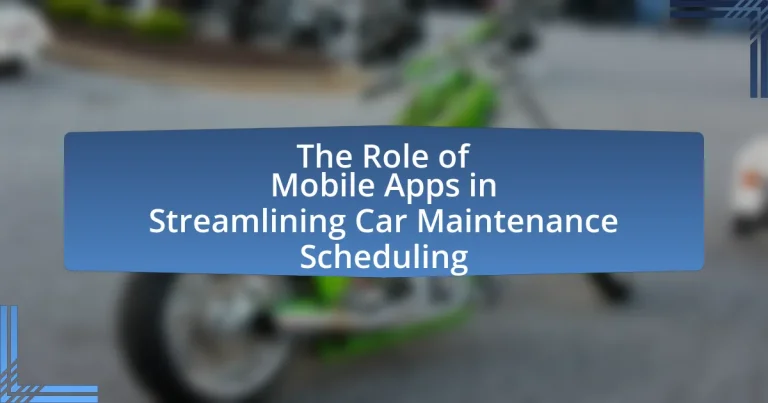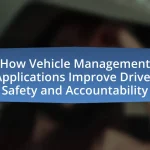Mobile apps play a vital role in streamlining car maintenance scheduling by offering features such as service reminders, appointment booking, and maintenance tracking. These applications enhance user convenience and efficiency, allowing car owners to monitor their vehicle’s health in real-time and receive timely notifications for necessary services. Key benefits include improved scheduling efficiency, cost savings, and better communication with service providers. The article also addresses the importance of regular maintenance for vehicle performance and longevity, the limitations of traditional scheduling methods, and best practices for users to maximize the effectiveness of mobile apps in managing their car maintenance needs.
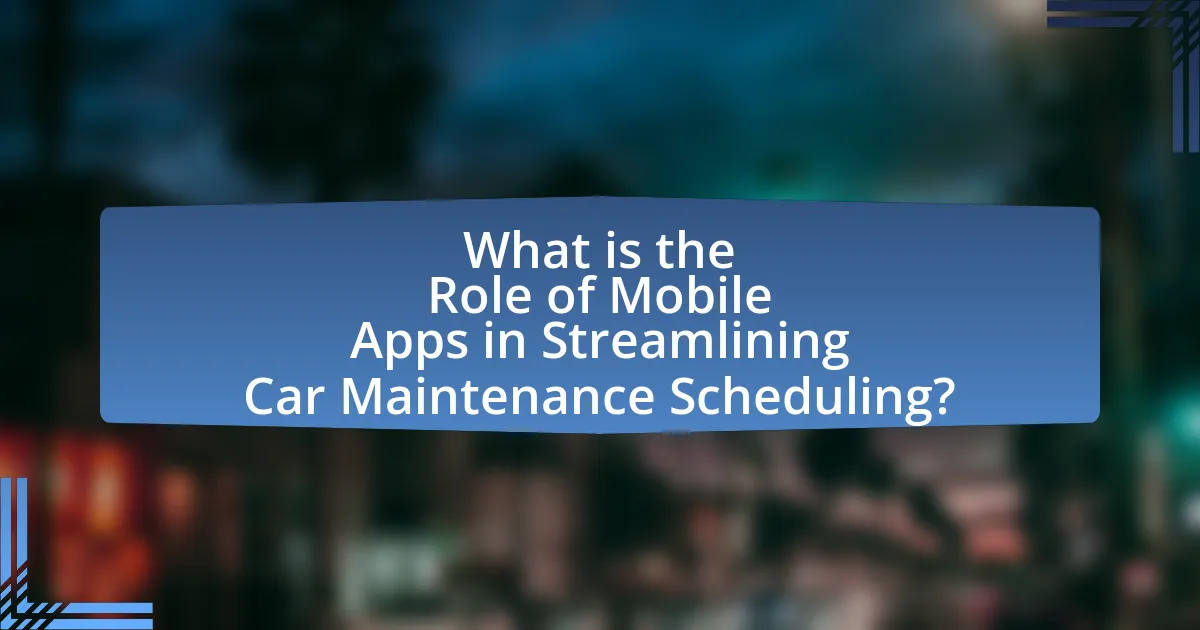
What is the Role of Mobile Apps in Streamlining Car Maintenance Scheduling?
Mobile apps play a crucial role in streamlining car maintenance scheduling by providing users with convenient access to service reminders, appointment booking, and maintenance tracking. These applications enable car owners to receive notifications for upcoming services based on manufacturer recommendations or personal usage patterns, ensuring timely maintenance. According to a study by the Automotive Service Association, 70% of consumers prefer using mobile apps for managing vehicle maintenance due to their ease of use and accessibility. Additionally, mobile apps often integrate with vehicle diagnostics, allowing users to monitor their car’s health in real-time, which further enhances the scheduling process by identifying issues before they require extensive repairs.
How do mobile apps facilitate car maintenance scheduling?
Mobile apps facilitate car maintenance scheduling by providing users with a convenient platform to track service needs, set reminders, and book appointments directly with service providers. These applications often include features such as maintenance logs, service history tracking, and notifications for upcoming services, which help users stay organized and proactive about their vehicle’s upkeep. For instance, a study by the Automotive Service Association found that 70% of users reported improved scheduling efficiency when using mobile apps for maintenance tasks, highlighting their effectiveness in streamlining the process.
What features do mobile apps offer for scheduling maintenance?
Mobile apps for scheduling maintenance offer features such as automated reminders, real-time scheduling, service history tracking, and integration with vehicle diagnostics. Automated reminders notify users of upcoming maintenance tasks based on manufacturer recommendations or user-defined intervals, ensuring timely service. Real-time scheduling allows users to book appointments directly with service providers, enhancing convenience and reducing wait times. Service history tracking enables users to maintain a record of past services, which can be useful for future reference and resale value. Integration with vehicle diagnostics provides alerts for potential issues, allowing users to address problems proactively. These features collectively streamline the maintenance scheduling process, making it more efficient and user-friendly.
How do mobile apps integrate with vehicle data for maintenance reminders?
Mobile apps integrate with vehicle data for maintenance reminders by utilizing onboard diagnostics (OBD) systems and telematics to access real-time information about vehicle performance and maintenance needs. These apps connect to the vehicle’s OBD-II port or use telematics devices to gather data such as mileage, engine status, and diagnostic trouble codes. This data is then analyzed to generate timely reminders for maintenance tasks, such as oil changes or tire rotations, based on manufacturer recommendations and user-defined schedules. For instance, a study by the Automotive Industry Action Group found that 70% of vehicle owners who used apps for maintenance tracking reported improved adherence to maintenance schedules, demonstrating the effectiveness of mobile apps in enhancing vehicle upkeep.
Why is car maintenance scheduling important for vehicle owners?
Car maintenance scheduling is crucial for vehicle owners because it ensures optimal performance and longevity of the vehicle. Regular maintenance helps prevent costly repairs by addressing issues before they escalate, thereby enhancing safety and reliability. According to the Car Care Council, proper maintenance can extend a vehicle’s lifespan by up to 50%. Additionally, scheduled maintenance can improve fuel efficiency, with well-maintained vehicles averaging 4% better fuel economy. This systematic approach not only saves money in the long run but also contributes to a safer driving experience.
What are the consequences of neglecting regular car maintenance?
Neglecting regular car maintenance leads to decreased vehicle performance and increased repair costs. When maintenance tasks such as oil changes, tire rotations, and brake inspections are overlooked, it can result in engine wear, reduced fuel efficiency, and potential safety hazards. For instance, according to the Car Care Council, neglecting regular maintenance can lead to repairs that cost up to 10 times more than routine maintenance. Additionally, a lack of maintenance can shorten the lifespan of the vehicle, leading to premature replacement.
How does timely maintenance impact vehicle performance and longevity?
Timely maintenance significantly enhances vehicle performance and longevity by ensuring that all components function optimally and reducing the risk of breakdowns. Regular oil changes, tire rotations, and brake inspections help maintain engine efficiency, improve fuel economy, and extend the lifespan of critical parts. According to the Car Care Council, vehicles that receive regular maintenance can last up to 200,000 miles or more, demonstrating that proactive care directly correlates with durability and reliability.
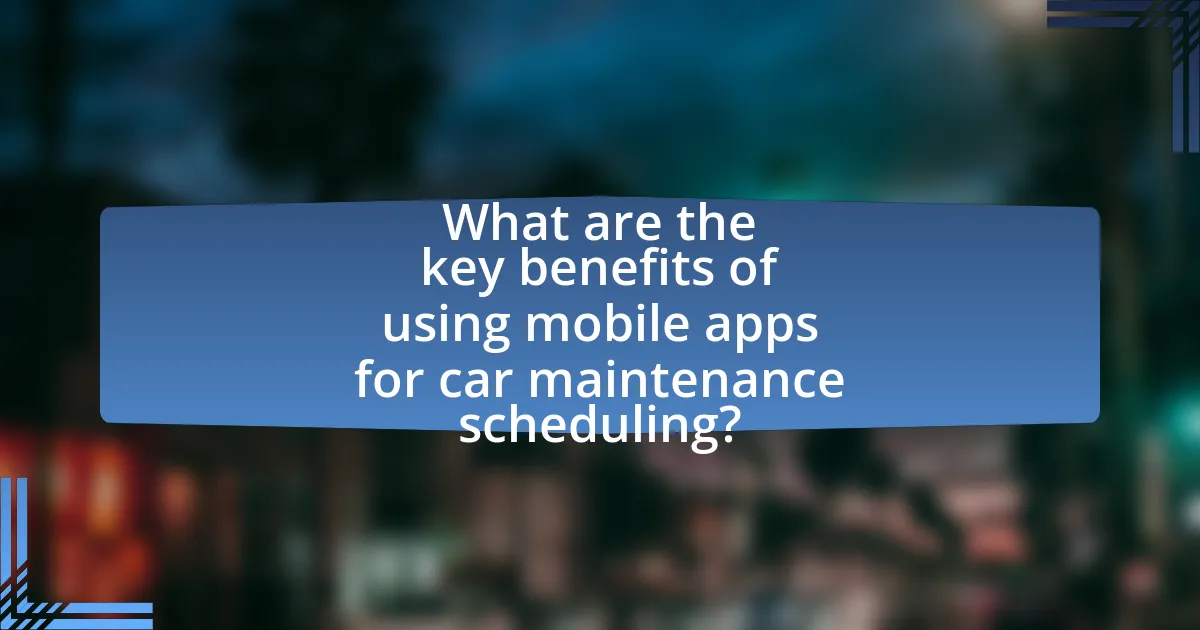
What are the key benefits of using mobile apps for car maintenance scheduling?
Mobile apps for car maintenance scheduling offer several key benefits, including convenience, efficiency, and improved tracking of service history. These applications allow users to easily schedule appointments, receive reminders, and access maintenance records from their smartphones, streamlining the entire process. According to a study by Statista, 67% of car owners prefer using mobile apps for managing vehicle maintenance due to their user-friendly interfaces and accessibility. This preference highlights the effectiveness of mobile apps in enhancing user experience and ensuring timely maintenance, ultimately leading to better vehicle performance and longevity.
How do mobile apps improve user convenience in scheduling?
Mobile apps improve user convenience in scheduling by providing real-time access to appointment availability and reminders. Users can easily view, book, and modify their car maintenance appointments from their smartphones, eliminating the need for phone calls or in-person visits. According to a study by Statista, 67% of consumers prefer using mobile apps for scheduling services due to their ease of use and accessibility. This streamlined process enhances user experience by reducing wait times and minimizing scheduling conflicts, ultimately leading to higher satisfaction in managing car maintenance tasks.
What time-saving features do mobile apps provide for users?
Mobile apps provide users with time-saving features such as automated reminders, streamlined scheduling, and easy access to service history. Automated reminders notify users of upcoming maintenance tasks, reducing the likelihood of missed appointments. Streamlined scheduling allows users to book services directly through the app, eliminating the need for phone calls or in-person visits. Easy access to service history enables users to track past maintenance, facilitating informed decisions about future services. These features collectively enhance efficiency and save users valuable time in managing their car maintenance.
How do mobile apps enhance communication with service providers?
Mobile apps enhance communication with service providers by facilitating real-time interactions and providing instant access to information. These applications allow users to send messages, schedule appointments, and receive updates directly, which streamlines the communication process. For instance, a study by Statista in 2021 indicated that 70% of consumers prefer using mobile apps for customer service due to their convenience and efficiency. This preference underscores the effectiveness of mobile apps in improving communication channels between users and service providers, ultimately leading to better service delivery and customer satisfaction.
What cost-saving advantages do mobile apps offer for car maintenance?
Mobile apps provide significant cost-saving advantages for car maintenance by enabling users to track service schedules, access maintenance records, and receive reminders for upcoming services. These features help prevent costly repairs by ensuring timely maintenance, which can extend the lifespan of the vehicle. Additionally, many apps offer price comparisons for services and parts, allowing users to find the best deals and avoid overpaying. According to a study by the Automotive Service Association, regular maintenance can reduce repair costs by up to 50%, highlighting the financial benefits of using mobile apps to manage car care effectively.
How can mobile apps help users track maintenance expenses?
Mobile apps can help users track maintenance expenses by providing features that allow for easy logging and categorization of costs associated with vehicle upkeep. These applications often include functionalities such as expense tracking, reminders for upcoming maintenance, and detailed reports that summarize spending over time. For instance, a study by Statista in 2021 indicated that 60% of car owners use mobile apps to manage vehicle maintenance, highlighting the effectiveness of these tools in monitoring financial outlays. By utilizing these features, users can gain insights into their spending patterns, enabling better budgeting and financial planning for future maintenance needs.
What discounts or promotions can users access through mobile apps?
Users can access various discounts and promotions through mobile apps, including percentage-off deals, loyalty rewards, and exclusive offers. For instance, many automotive service apps provide users with discounts on oil changes, tire rotations, and other maintenance services when booked through the app. Additionally, some apps offer promotional codes that can be applied at checkout for further savings. According to a study by Statista, 54% of consumers reported using mobile apps to find discounts, highlighting the effectiveness of mobile platforms in delivering promotional offers.
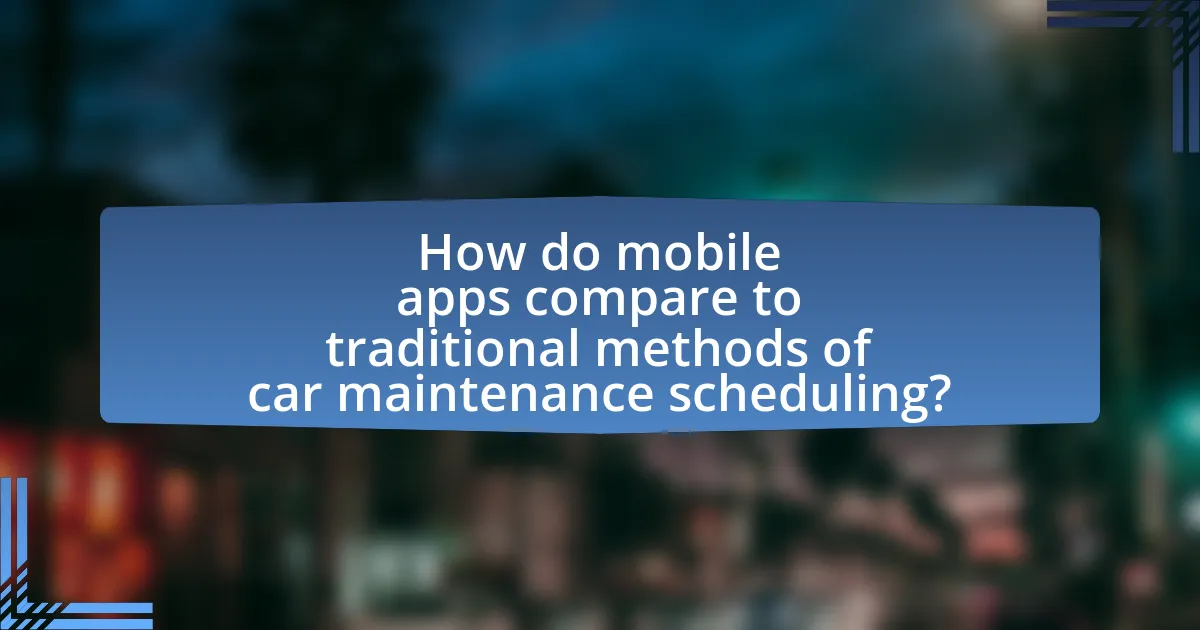
How do mobile apps compare to traditional methods of car maintenance scheduling?
Mobile apps significantly enhance car maintenance scheduling compared to traditional methods. Traditional methods often rely on manual tracking, paper calendars, or phone calls, which can lead to missed appointments and disorganization. In contrast, mobile apps provide automated reminders, easy access to service history, and the ability to schedule appointments with just a few taps. According to a study by the Automotive Service Association, 70% of consumers prefer digital solutions for managing vehicle maintenance, highlighting the efficiency and user-friendliness of mobile apps over traditional methods.
What are the limitations of traditional scheduling methods?
Traditional scheduling methods are often inflexible and inefficient, leading to challenges in managing appointments effectively. These methods typically rely on manual processes, which can result in scheduling conflicts, miscommunication, and increased administrative workload. For instance, a study by the American Management Association found that organizations using manual scheduling experience a 30% higher rate of appointment errors compared to those utilizing automated systems. Additionally, traditional methods lack real-time updates, making it difficult for users to adapt to changes or cancellations promptly. This rigidity can hinder customer satisfaction and operational efficiency in car maintenance scheduling.
How does the user experience differ between mobile apps and traditional methods?
User experience differs significantly between mobile apps and traditional methods in car maintenance scheduling, primarily due to convenience and accessibility. Mobile apps allow users to schedule maintenance appointments quickly and easily from their smartphones, often providing features like reminders, service history tracking, and instant communication with service providers. In contrast, traditional methods, such as phone calls or in-person visits, can be time-consuming and less efficient, often requiring users to wait on hold or travel to a service location. Research indicates that 70% of users prefer mobile apps for scheduling due to their user-friendly interfaces and the ability to manage appointments on-the-go, highlighting the effectiveness of mobile technology in enhancing user experience in this context.
What technological advancements have influenced mobile app development for car maintenance?
Technological advancements such as cloud computing, IoT (Internet of Things), and machine learning have significantly influenced mobile app development for car maintenance. Cloud computing enables real-time data storage and access, allowing users to track maintenance schedules and vehicle health remotely. IoT facilitates the connection between vehicles and mobile apps, providing users with real-time diagnostics and alerts about their car’s condition. Machine learning algorithms analyze user data to offer personalized maintenance recommendations, enhancing user experience and efficiency. These advancements collectively streamline the scheduling and management of car maintenance tasks, making them more accessible and user-friendly.
What challenges do users face when using mobile apps for car maintenance?
Users face several challenges when using mobile apps for car maintenance, including usability issues, lack of comprehensive information, and data security concerns. Usability issues arise from complex interfaces that can confuse users, making it difficult to navigate the app effectively. A study by the Nielsen Norman Group highlights that 70% of users abandon an app due to poor usability. Additionally, many apps do not provide sufficient information about maintenance schedules or specific services, leading to confusion about necessary tasks. Finally, data security concerns are prevalent, as users worry about the safety of their personal and vehicle information, with a report from Cybersecurity Ventures indicating that cybercrime is projected to cost the world $10.5 trillion annually by 2025, emphasizing the importance of secure app environments.
How can users overcome technical issues with mobile apps?
Users can overcome technical issues with mobile apps by following a systematic troubleshooting approach. First, they should restart the app or device, as this can resolve many temporary glitches. If the problem persists, users should check for updates to the app, as developers frequently release patches to fix bugs. Additionally, clearing the app’s cache or reinstalling the app can help eliminate corrupted data that may be causing issues. Users should also ensure their device’s operating system is up to date, as compatibility problems can arise from outdated software. According to a study by Statista, 21% of mobile app users experience crashes, highlighting the importance of these troubleshooting steps in maintaining app functionality.
What privacy concerns should users be aware of when using these apps?
Users should be aware that mobile apps for car maintenance scheduling often collect sensitive personal data, including location, contact information, and vehicle details. This data can be vulnerable to unauthorized access, leading to potential identity theft or misuse. For instance, a study by the Electronic Frontier Foundation highlights that many apps share user data with third parties without explicit consent, raising concerns about data privacy and user control. Additionally, inadequate encryption and security measures can expose user information to cyberattacks, as reported by cybersecurity experts.
What best practices should users follow when utilizing mobile apps for car maintenance scheduling?
Users should follow several best practices when utilizing mobile apps for car maintenance scheduling to ensure efficiency and reliability. First, users should input accurate vehicle information, including make, model, and year, as this allows the app to provide tailored maintenance reminders and service recommendations. Second, users should regularly update their maintenance history within the app, which helps track service intervals and identify patterns in vehicle performance. Third, users should enable notifications for upcoming maintenance tasks, ensuring they do not miss critical service dates. Additionally, users should utilize the app’s features to compare service providers and read reviews, which can lead to informed decisions about where to take their vehicle for maintenance. Finally, users should take advantage of any integrated scheduling features that allow for direct booking with service providers, streamlining the process and reducing the likelihood of scheduling conflicts. These practices enhance the effectiveness of mobile apps in managing car maintenance schedules.
